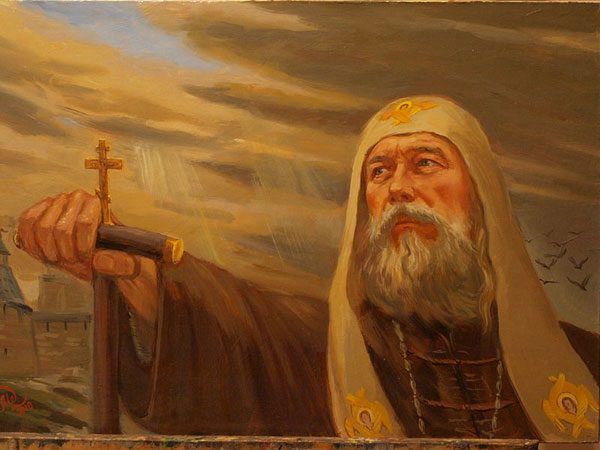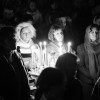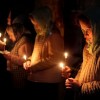In the Name of the Father, Son and Holy Spirit!
Today the church celebrates the memory of Metropolitan Philip, one of Moscow’s celebrated Holy Archbishops. Many of you have visited the village of Peredelkino near Moscow and seen the old church there, where the Patriarch’s residence is now located. the future Metropolitan of Moscow and martyr grew up in that building, or somewhere near there (this was the province of the Kolychev boyar clan).
Of course, he could have led a calm and privileged life, just like any boyar’s child, devoting time to studying, hunting, recreation, household duties and family activities. The young Kolychev could have lived out his life doing those things. But Philip wanted to devote his life to serving God and mankind. His journey took him to a distant northern monastery on the Solovetskii islands, which became a famous library, detention center and concentration camp. Today its majestic ruins disturb our conscience (Ed. note: The Solovetsky Monastery has been extensively repaired, but remains under reconstruction.)
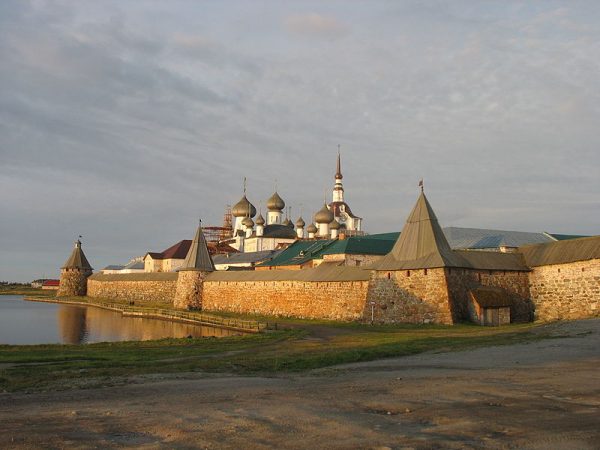
The monastery in August 2009.
Having become an abbot, Philip began to serve at one of the monasteries. The monks and their abbot worked hard to tame that savage area. They had a hard life, since they had to clear impassible wilderness with their own hands far away from the shores of cold seas. Each new step was undertaken with great difficulty. The monastery is located in a permafrost area frigid in winter and plagued with swarms of mosquitos in the summer. Nonetheless, these were beautiful places that could and needed to be made livable, and the monks accomplished this objective.
Philip should have spent his life laboring and praying with the others, but fate suddenly intervened. Ivan IV summoned him to Moscow and informed him that he would become the next head of the Russian Orthodox Church. Tsar Ivan had known Philip for some time. He knew that the new Metropolitan was an honest, incorrputible and reliable man, one whom he could trust. Like all tyrants, the Tsar valued these qualities, since he feared conspiracies and betrayal. His soul was wracked by paroxysms of fear and cruelty.
In the history of our motherland, there were two periods in which tyranny paralyzed our people: the reign of Tsar Ivan, whom we call “Terrible,” and again in the time of Stalin, who admired Ivan and tried to follow his bloody example. Across the centuries, he perceived in that executioner a kindred spirit. And so it was that Ivan the Terrible, who struck fear in the heart of the church and the people of Russia, was doomed to live in fear. Like every other criminal ruler, he could not help but be terrified at what he had done, at the outrages he had perpetrated. Many times he would flee to the Holy Trinity Monastery, where he would fill several books of remembrace, inscribing in them the names of hundreds of people whom he had killed–men, women, children, the prominent and the obscure, all those he had slandered, those whose families and homes he had sundered and whose blood he had spilled. He would wail and pray for his victims, then confess his sins to the monks. Then, when he tired of repenting, he would again indulge in violence and wild orgies, only to be convulsed again with fear afterwards.
Once, Ivan fled to Alexandrov, hid there and announced that he would no longer govern. Everyone became terribly upset and fearful, convinced that without a ruler, the country would soon be vulnerable to all kinds of outrages. A delegation was dispatched to beg Ivan to return. The Tsar agreed, but returned more cruel than ever and surrounded himself with a secret guard–the oprichnina. The oprichniki dressed all in black and served as the executioners of the people, barging into people’s houses with neither permission or threat of punishment to burn, rape and kill. These were the kind of people guarding the Tsar, Ivan’s own secret police.
When Philip came to Moscow, the Tsar received him warmly, but Philip took care to say, “If you want me to work here in Moscow for the Church, you must give me the right to conduct pechalovaniia (in ancient times, this referred to public prayers for the repressed). The Tsar hesitated, but finally agreed, and only on this condition did Philip accept the white miter of the Moscow Metropolitan.
At first, Philip was able to influence Ivan in a positive way, even mitigating his cruelty for a time. On several occasions the Tsar and the Metropolitan came face to face in the Kremlin corridors and Philip would say, “Sire, you must not spill human blood, Christian blood. Why do you believe everyone is against you? If you do not behave reprehensibly, you will have nothing to fear.” Chastened, the Tsar would put aside his evil plans. But Philip saw profound changes in the Tsar’s face and soul. He had known the Tsar as a handsome and open man in his youth. Now, although Ivan was only about 40 years old, he already looked like a bitter old man; he had a frightening countenance and insanity in his eyes.
One day the Tsar joined in another mass murder. Afterward, he and his black-robed oprichniki, who were all on horseback, galloped up to the Kremlin cathedral where Philip served. The entire entourage strode into the church. Ivan stared at the Metropolitan and shattered the silence in the church, loudly demanding, “Why do you fail to bless your Tsar and Sovereign?” Philip turned and answered in a calm voice, “I do not acknowledge the Christian Tsar in his outrageous behavior.” “Look out, my monk friend,” warned Ivan. “Don’t intrude into my affairs, or you will bitterly regret it.” But Ivan knew that Metropolitan Philip was an honest and direct man who would never grovel or act contrary to the dictates of his conscience. When Philip was a monk living in the north, he kept quiet about the Tsar, but when he became head of the Church, he took upon himelf the responsibility to bear witness. Philip gathered the clergy and discussed how to restrain Ivan’s extraordinary cruelty. No one supported Philip; all were silent because they were afraid.
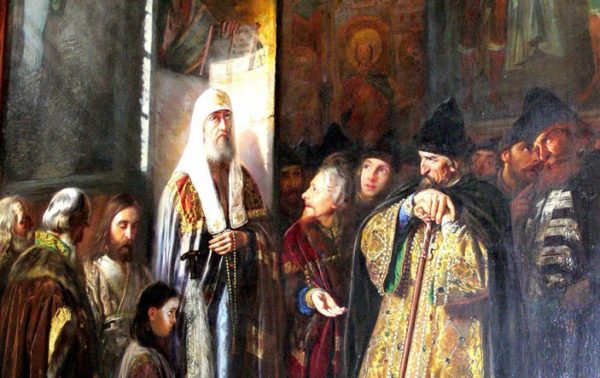
When the next conflict arose between the Tsar and the Metropolitan in the cathedral, Ivan resolved to do away with Philip. His method was cowardly, as is typical of all lovers of violence. He would not do the deed himself; that would fall to his henchmen. He summoned the church leadership and forced them to strip Philip of the title of Metropolitan. During a service, the oprichniki broke into the church, arrested Philip and ordered church leaders to strip him of his Metropolitan’s vestments. The Tsar’s henchmen then tied Philip in an open-air carriage–it was winter–and took him to the Kremlin to subject him to a unfair trial. Judgement came swift and cruel, and Philip was sentenced to exile in a monastery north of Moscow. *
Several times the order went out to starve him to death, but Philip was used to long fasts and possessed of a strong constitution, so he lived. When the Tsar was attempting to subjugate the people of Great Novgorod, he decided to stop by the monastery where he had imprisoned Philip. He sent his assistant and chief executioner, Maliuta Skuratov, with these words: “Go, let Philip come and bless us.” Maliuta entered the monastery and found Philip at prayer with the other monks.
In the picture gallery in Troitse-Sergiev Posad, there hangs a l9th-century picture of Philip on his knees before an icon. He was gaunt and exhausted-looking, but serene in his faith in God. At the same time, Maliuta Skuratov–looking like the grim reaper in his black cloak–breaks into the scene. “Bless us for our dastardly deed!” he bellows. Philip is unmoved. Enraged, Maliuta throws himself at Philip and strangles him with the pillow on which Philip was kneeling. Leaving the body in the church, Maliuta stepped out and informed the monks, “Your Philip has died of poisoning. Bury him!”
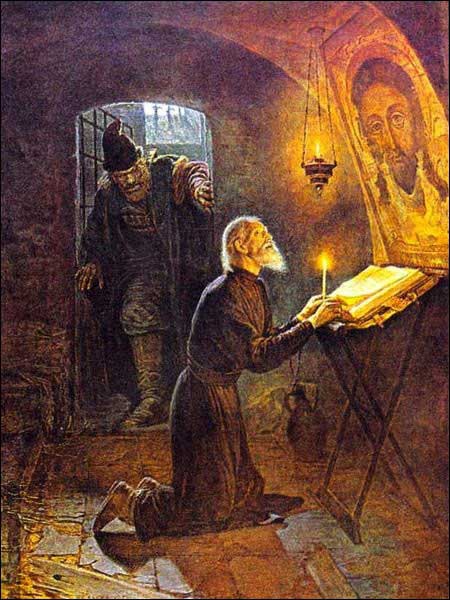
Thus ended the life of Metropolitan Philip. Ivan the Terrible died a short time later. Ivan died young; he was not even sixty. He died after having killed one of his sons in a senseless rage and lost many close relatives and friends. He died alone, in deep and bitter despair. His legacy is bloody and violent. By contrast, Philip was canonized by the Church. Many centuries later, he remains a great example, having done what was right regardless of the consequences. Life is short. If we cannot do what is right in this one, is there any use in planning for the next?
We all know too well that man is weak, that he lacks the strength to fulfill his duty here on earth. But we remember the saints and ask that they pray for us and intercede with the Lord Jesus Christ, so that He will raise us out of the ashes and make us servants of His truth through the strength of his love. Amen.
Transalted by Brigit Farley












